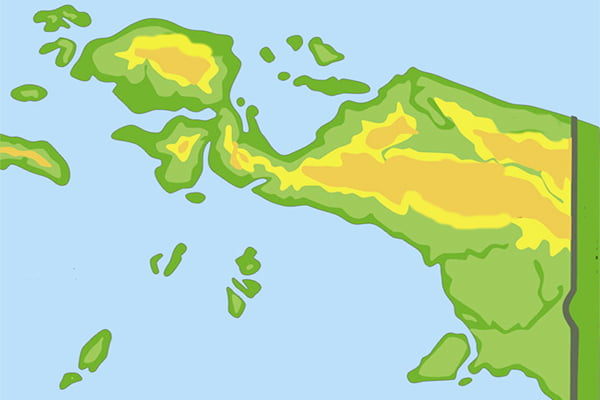Government Accelerates Provision of Government Facilities in Four Special Regions of Papua
Since its inauguration, four new provinces or New Autonomous Regions (DOB) in Tanah Papua have tried to organize themselves optimally. The four provinces, South Papua, Central Papua, Mountain Papua and Southwest Papua, emerged as a result of regional expansion. Three of them, South Papua, Central Papua and Mountain Papua, were formed from the Papua region, while Southwest Papua was the result of the expansion of West Papua Province
The central government has paid special attention to ensuring the running of government in these four new provinces. An acting governor has been appointed, and self-organization efforts are underway in the hope of providing better public services for the Papuan people.
The Ministry of Home Affairs (Kemendagri) claims that the wheels of government are running, although there are still several challenges. There are four indicators used as a benchmark by the Ministry of Home Affairs in assessing government readiness in the four new provinces. One indicator is the formation of regional apparatus organizations in each new province, which marks the start of services to the community in accordance with their respective duties.
In an effort to improve prosperity and equitable development in the Papua region, the Central Government has taken strategic steps by accelerating the provision of government facilities in the four new autonomous regions in Papua to strengthen governance and provide better public services in the Land of Papua.
In an effort to accelerate development in Papua, the government, through Vice President Ma’ruf Amin, stated its commitment to accelerate the development of government infrastructure in the four new autonomous regions of Papua. The new autonomous regions include Central Papua, South Papua, Mountain Papua and Southwest Papua. This statement was conveyed by Vice President Ma’ruf Amin after chairing the Plenary Meeting of the Steering Committee for the Acceleration of Special Autonomy Development for Papua (BP3OKP) at the Vice President’s Palace, some time ago.
The meeting, chaired by Vice President Ma’ruf Amin, aims to evaluate the acceleration of special autonomy development in Papua. During the meeting, several strategic issues were discussed, including the follow-up to the formation of four Papuan Special Regions, resolving the Papua Superior Students scholarship problem, and the sustainability of Papua’s development in the future government. This shows that the government is committed to ensuring accelerated development is not only limited to physical infrastructure, but also includes the education, health and transportation sectors. These sectors have actually become part of the development program which is expected to run well. In this way, human resource development and improving the quality of life of the Papuan people can run optimally.
The BP3OKP Plenary Meeting, which was held for the first time in Jakarta, was also attended by a number of high-ranking officials, such as the Minister of Home Affairs, the Minister of National Development Planning/Head of Bappenas, the Deputy Minister of Finance, and the Head of the BP3OKP Secretariat. BP3OKP itself has a big mission in development in Papua which is stated in the 2022-2041 Papua Development Acceleration Master Plan (RIPPP), covering four main pillars: Healthy Papua, Smart Papua, Productive Papua, and Just and Peaceful Papua.
Holding the BP3OKP Plenary Meeting is one of the government’s strategic steps to resolve strategic issues and challenges that arise in Papua’s development. For more than a year on duty since being appointed, BP3OKP members have carried out the synchronization, harmonization, evaluation and coordination (SHEK) function well in their respective regions, and continue to strive to communicate government policies to the Papuan people, bridging aspirations in their respective regions. through coordination with provincial and district/city governments, as well as being actively involved in regional and national development planning deliberation forums (musrenbang).
Meanwhile, the Deputy Minister of Home Affairs, John Wempi Wetipo, has also emphasized that the government will continue to build coordination with relevant ministries and institutions, especially the Ministry of Public Works and Public Housing (PUPR), to ensure accelerated development can be realized in the four new autonomous regions of Papua. Wempi Wetipo also ensures that the commitment to accelerate development in Papua is not only a discourse, but is also realized through close collaboration between various related agencies.
However, this effort cannot be separated from various challenges such as difficult geographical conditions, limited human resources, and potential social conflict. To overcome these challenges, the government has adopted an inclusive strategy, including through active involvement of local governments and local communities in every stage of development, as well as training and empowering local human resources. The government also utilizes appropriate technology to overcome geographical barriers and increase development efficiency.
By accelerating the provision of government facilities in the four new autonomous regions of Papua, it is hoped that there will be a significant improvement in the quality of life of the Papuan people in the long term. This also confirms a strong commitment to accelerate development in Papua, especially in the four new autonomous regions. The active participation of representatives from each province in Papua in strategic meetings shows the importance of coordination and involvement of all parties in achieving inclusive and sustainable development goals. With a comprehensive and coordinated approach, it is hoped that the acceleration of development in Papua can be carried out well, provide real benefits for the Papuan people, and support the creation of a Papua that is healthy, intelligent, productive, just and peaceful.
